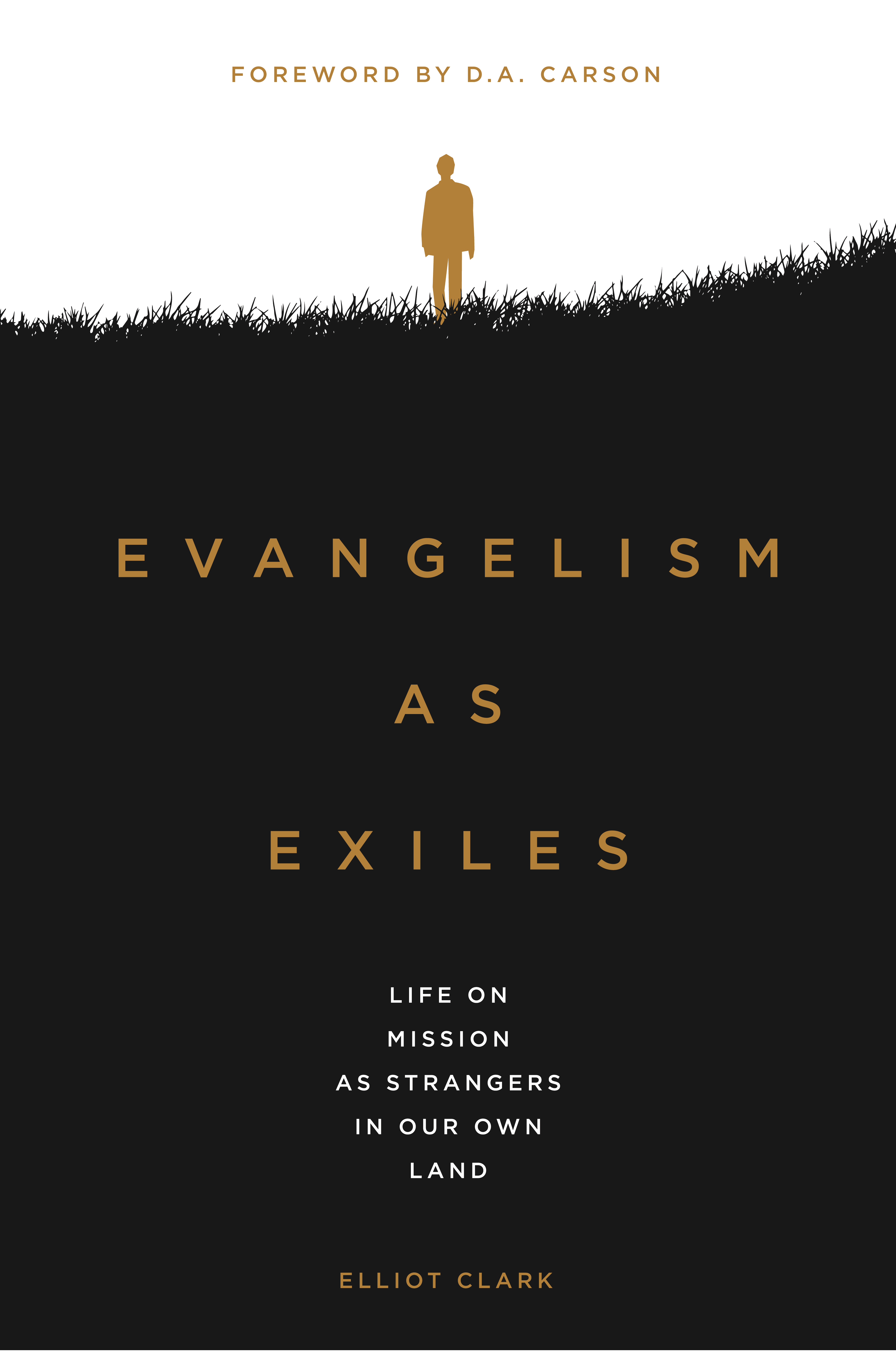The American church has a problem.
She just can’t give up the idea that success and prosperity are what God ought to give her. Even we who strongly denounce the prosperity gospel are drawn to the idea that growth and influence is inevitable for the faithful. “If you build it, they will come” is a national slogan—and assumption. If we do church right, the church will grow. If we’re faithful in just the right way, the culture will respect and listen to us.
But as it becomes increasingly clear that we don’t actually belong in America, that we aren’t welcome in the public square, and that our beliefs are considered bigoted and backward, we’re easily tempted to discouragement and fearfulness. Elliot Clark diagnoses the problem: “The mere potential of such shame, the possibility of being made an outsider, hinders me from practicing bold evangelism” (33).
Clark’s Evangelism as Exiles: Life on Mission as Strangers in our Own Land critiques precisely this idea in order to encourage the church toward faithful evangelism in a culture increasingly hostile to the faith. Our identity as Christians in this world is one of chosen exiles. Having a proper sense of that identity is fundamental to living as faithful witnesses in a world hostile to the gospel. Clark sketches a description of our identity as exiles and sojourners and demonstrates how it grounds and informs the Christian mission.

Evangelism as Exiles: Life on Mission as Strangers in our Own Land
Elliot Clark
Evangelism as Exiles: Life on Mission as Strangers in our Own Land
Elliot Clark
The days of cultural Christianity are fading. It’s time to rethink normal. Suffering and exclusion are normal in a believer’s life. At least they should be. This was certainly Jesus’s experience. And it’s the experience of countless Christians around the world today. No matter your social location or set of experiences, the biblical letter of 1 Peter wants to redefine your expectations and reinvigorate your hope. Drawing on years of ministry in a Muslim-majority nation, Elliot Clark guides us through Peter’s letter with striking insights for today. Whether we’re in positions of power or weakness, influence or marginalization, all of us are called to live and witness as exiles in a world that’s not our home. This is our job description. This is our mission. This is our opportunity.
What’s It About?
Evangelism as Exiles uses 1 Peter’s counsel to Christians who are “elect exiles” as the framework for living as faithful witnesses.
After encouraging Christians to embrace their identity as exiles in this world (1 Pet. 1:1–2), Clark grounds that identity in the hope of our glorious home to come (1 Pet. 3:15). He points out why we ought to fear God more than man, yet also to show respect to all (1 Pet. 1:17; 2:13–17). He helpfully describes evangelism as a confident declaration of God (1 Pet. 2:9–10). He shows how living distinctively Christian lives, especially in hardship and opposition, proclaims the beauty of Christ (1 Pet. 2:11–12). And he concludes by meditating on the beauty of the family of God—the promise that we enjoy a taste of our heavenly home even in this life, and how wonderfully powerful that gospel community is as a witness to the gospel (1 Pet. 4:8–10).
Faithful Evangelism and the Sovereignty of God
One of the most rewarding elements of the book is the encouraging illustrations sprinkled throughout, taken from Clark’s experiences proclaiming the gospel in a Muslim-majority country. Because many Western believers view the Muslim world as one of the hardest places to be a faithful Christian, Clark’s illustrations demonstrate the power of bold and gracious declaration, patient confidence in God’s work, and loving, hospitable lives.
One of the more convicting portions of this book was Clark’s critique of our euphemistic description of evangelism as “sharing the gospel” (94–97). Clark cautions against using language that implicitly catechizes us to look only for those interested in receiving the gospel. If we believe in God’s sovereignty—if we believe God can act like he does in the Bible—then we don’t need to wait for someone who wants what we’re sharing. We can boldly announce the gospel, warn people they must repent and believe, and be confident that God can save even those who are opposed.
Many Christians are a little embarrassed to talk too much about heaven and the hope of glory. It feels a little “pie-in-the-sky,” a little too removed from reality. But Clark (channeling the apostle Peter) helps us meditate on our wonderful hope and how that serves as an engine for confident, gracious proclamation: “We need to hear and believe the promise of our future exaltation in order to overcome the threat of shame and disgrace that would silence our witness” (33).
Evangelism and the Church
Many Christians struggle to include other Christians in their evangelistic efforts. Some might invite their non-Christian friends to a church service, but it feels like cheating to invite a fellow member to get to know and invest in our friends. We act like evangelism is a spiritual discipline we must do by ourselves for it to count for anything. My friends are my responsibilities. That thinking is wrong, and it fails to recognize the evangelistic effectiveness of a community committed to living faithfully together.
Because most of Clark’s illustrations come from his experience evangelizing in a context without established churches, it could be easy to walk away from this book with that mentality reinforced. Though he speaks about the beauty of hospitality as an encouragement to converts who have lost the support of their families (ch. 13), even that feels focused on what you and your family can provide. A greater emphasis on the encouragement we’re provided through living life as exiles together would make this an even more helpful tool.
Buy It, Read It, Give It Away
Elliot Clark’s book is a gift to Christians tempted to feel discouraged by their increased sense of alienation in America. More than that, it’s a clarion call to confidently declare the gospel in a world that desperately needs it.
A book this encouraging and convicting on evangelism is a must-have for pastors to read and give away liberally.
A version of this review appeared at 9Marks.




































